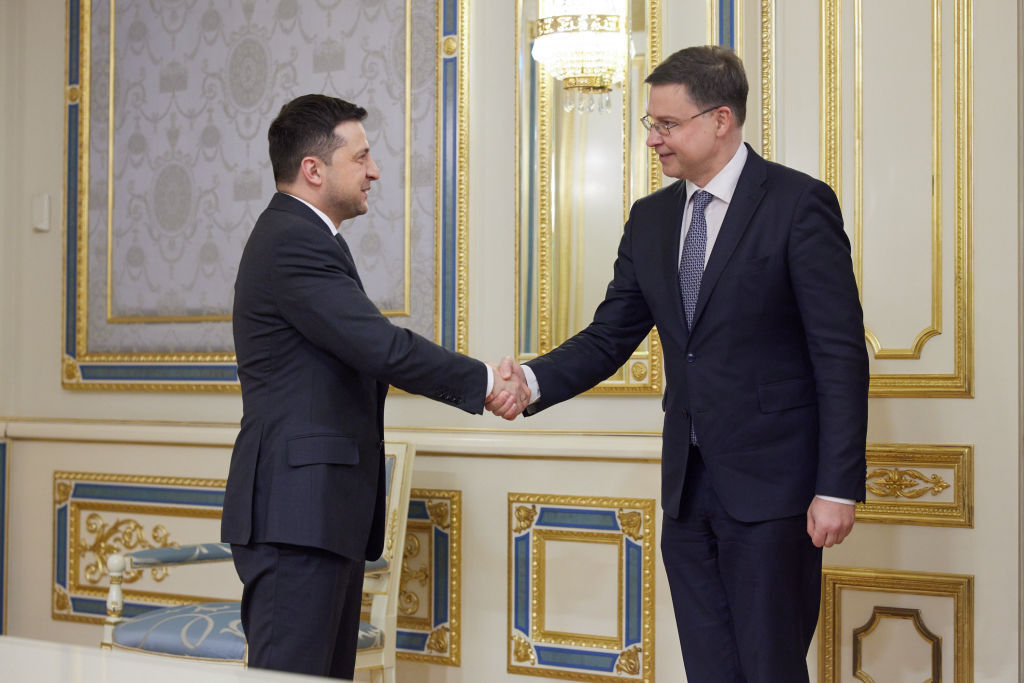The European Commission is calling on Western allies to accelerate payments from a $50 billion loan to Ukraine, as Belgium continues to stymie EU efforts to support Kyiv’s war effort with a larger funding scheme using Russian assets.
In an interview with Euractiv, Economy Commissioner Valdis Dombrovskis said countries should frontload disbursements to Ukraine from a G7 loan, agreed in June last year, to plug the war-torn country’s looming financial black hole early next year.
“We are in discussions with other international donors, seeing whether their support can be frontloaded to the beginning of the year,” Dombrovskis said, adding that the donors include the UK, Canada, Japan, and the US.
This “may be sufficient … to cover Ukraine’s funding needs in the first quarter of next year”, although this still “remains to be seen,” the Latvian commissioner added.
The EU has already paid out its share of the G7 loan, which totals €18.1 billion. But roughly €14 billion of the package has not yet been disbursed by other countries, namely the US, Canada, Japan, and the UK. Kyiv is estimated to face a $12 billion (€10 billion) budget shortfall in the first quarter of next year.
Dombrovskis’ remarks come as the EU struggles to agree a separate €185 billion “reparations loan” ahead of a decisive European leaders summit on 18 and 19 December, where the Commission hopes to persuade Belgium to back the scheme. But those efforts hit a major setback on Thursday when Prime Minister Bart De Wever fiercely criticised the plan in a letter to Commission President Ursula von der Leyen.
The reparations loan aims to use cash balances associated with Russian sovereign assets held by Euroclear, a Brussels-based clearing house, which were frozen by the EU after Russia’s full-scale invasion of Ukraine in 2022.
The G7 loan, on the other hand, is already underway and harnesses income produced by the assets.
Belgium has refused to back the reparations loan unless its legal and financial risks are shared and other EU countries exploit Russian assets held in their own jurisdictions. Euroclear has expressed similar reservations about the plan.
Belgian Prime Minister Bart De Wever has still not budged from his opposition to the scheme, which is expected to be formally proposed by the Commission in the coming days.
Dombrovskis said that getting the Belgians on board was not a “pre-condition” for publishing a detailed legal proposal for how it would work in practice – but Belgian agreement would be “ideal.”
While there has been “technical progress” in talks between EU and Belgian officials, he admitted there was scant political movement. “At this stage … it’s also clear that Belgium still has not moved in accepting this concept,” he said.
The proposal will “obviously” address Belgium’s concerns, Dombrovskis said. “Belgium and other member states will expect clarity.”
‘Bridging’ solution
The veteran commissioner also warned that a separate EU “bridging” solution to temporarily plug Ukraine’s budget gap “may be necessary” if negotiations with Belgium are not “rapidly making progress” by the end of the year.
Such schemes, outlined in an “options paper” circulated to EU capitals last week, would see common EU debt and bilateral member state grants used as alternative ways of temporarily plugging Kyiv’s budget gap.
The paper estimates that Ukraine will require €72 billion worth of military and social support in 2026, and an additional €64 billion in 2027.
Von der Leyen suggested earlier this week that these alternatives would not fly if they were entirely funded using EU taxpayers’ money.
Dombrovskis, a former Latvian prime minister, stressed the EU needs “to move forward, because Ukraine’s funding needs are not only sizeable, they are also urgent.”
“We cannot endlessly discuss our options,” he said. “We need to take concrete decisions.”
(aw, jp)
